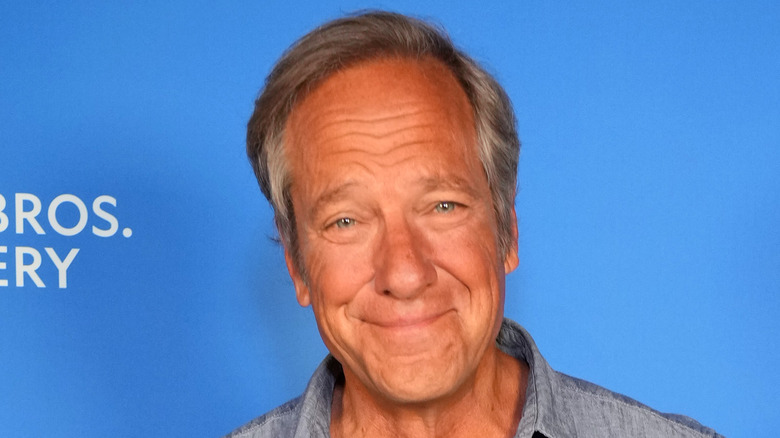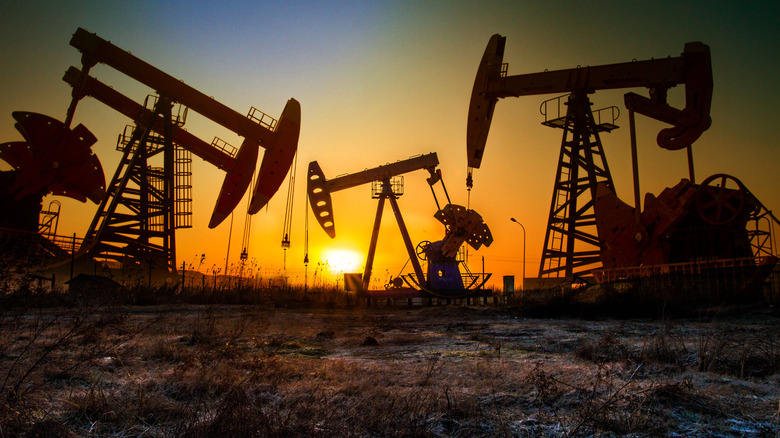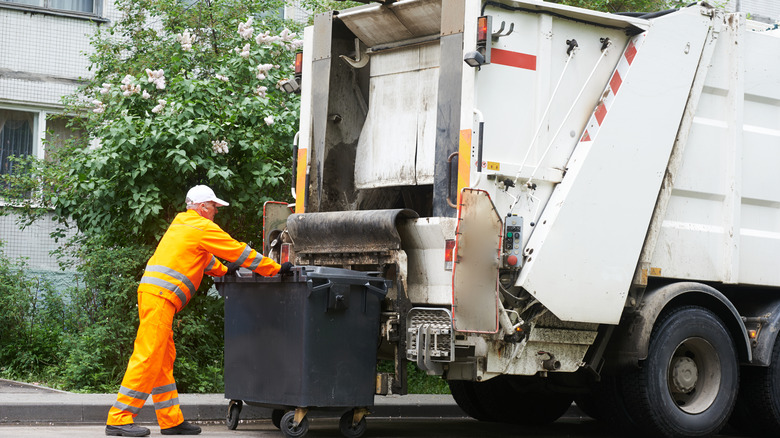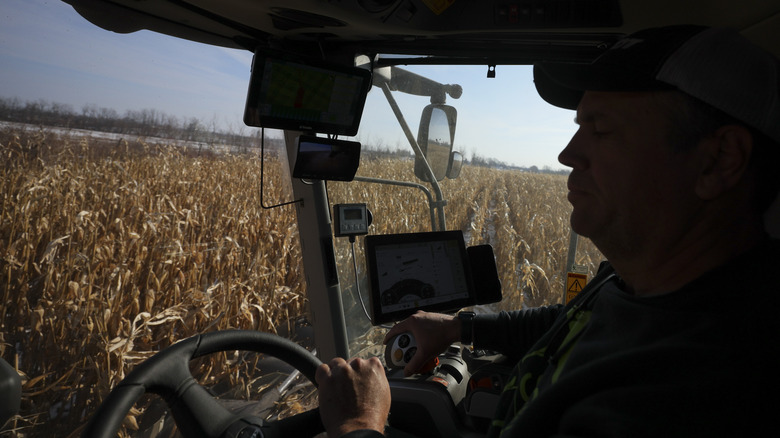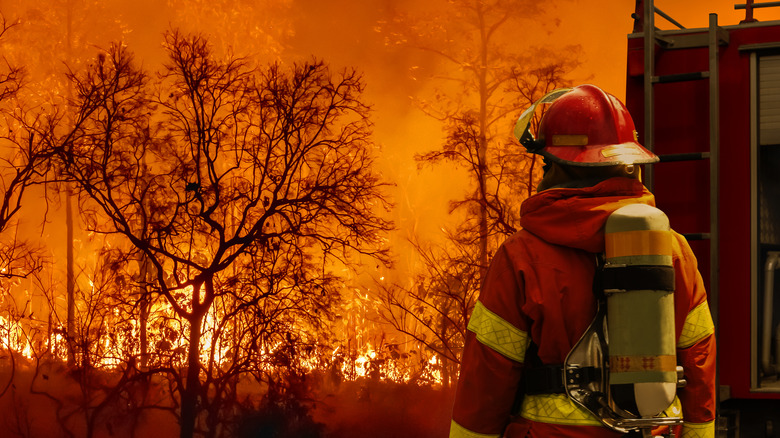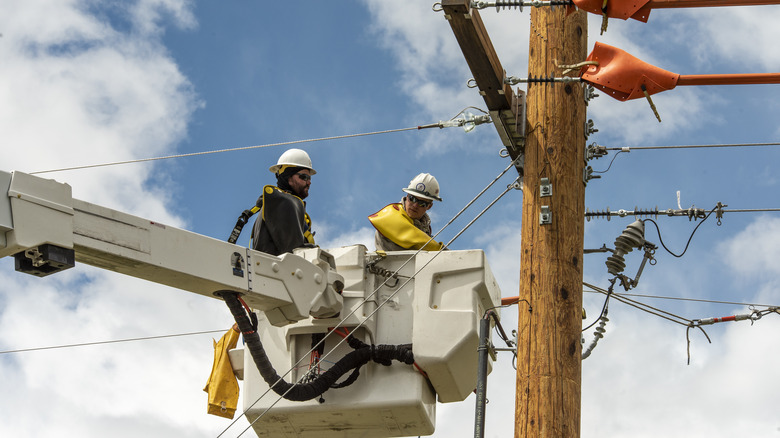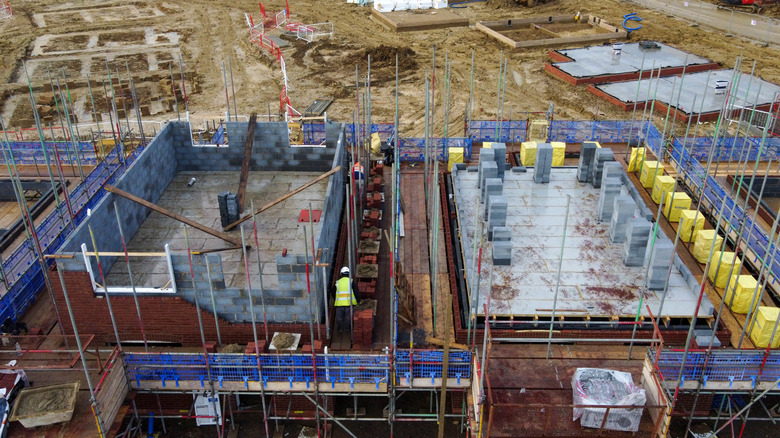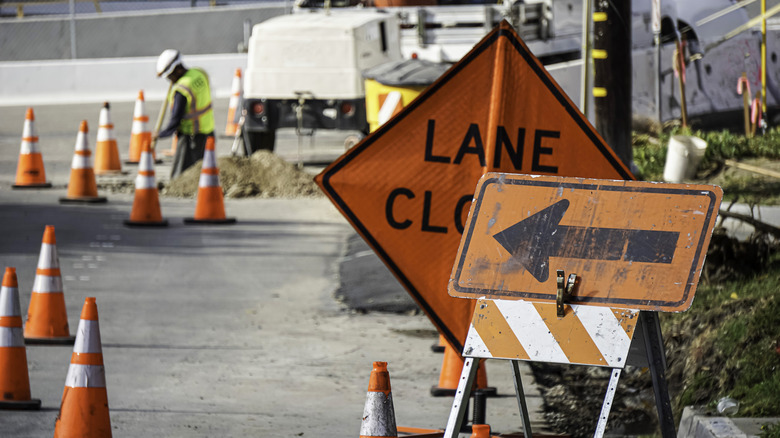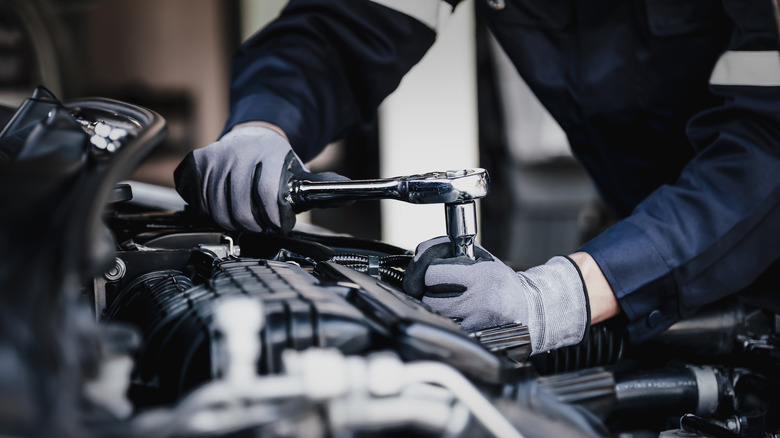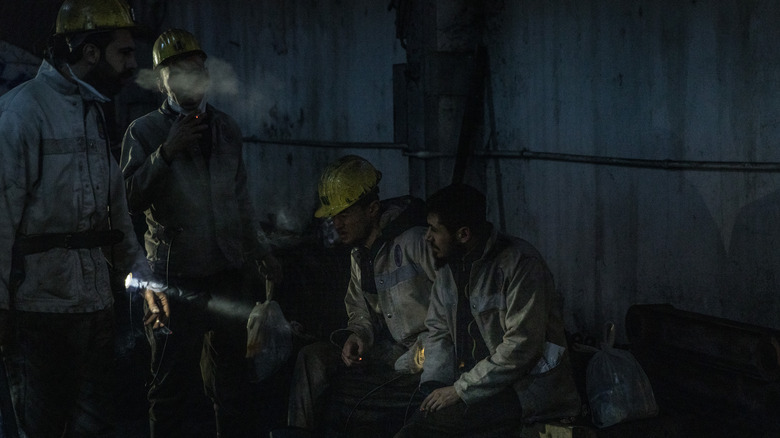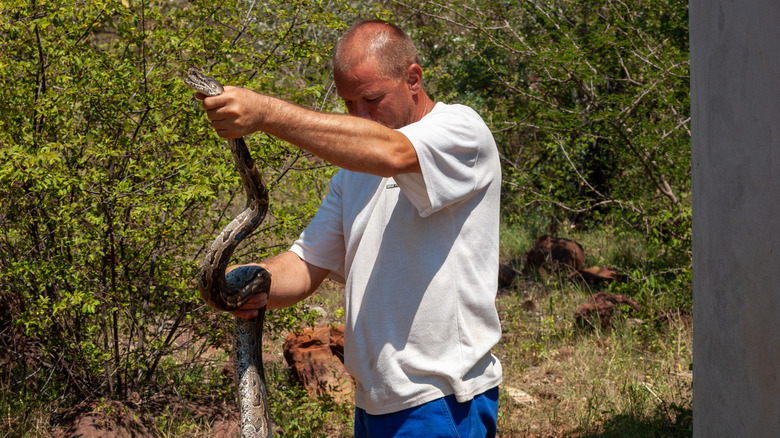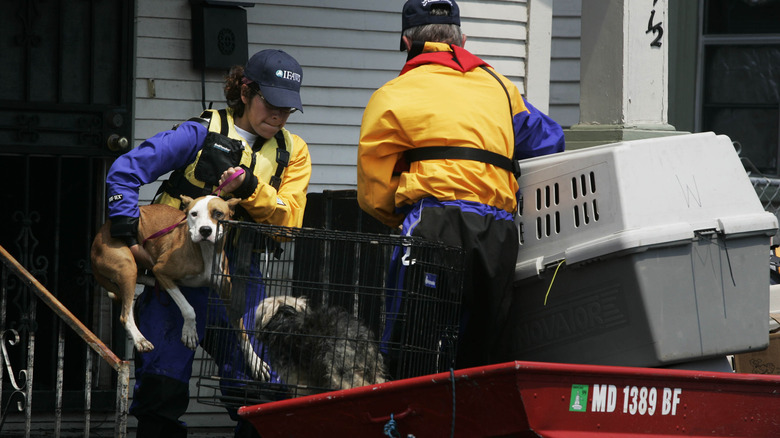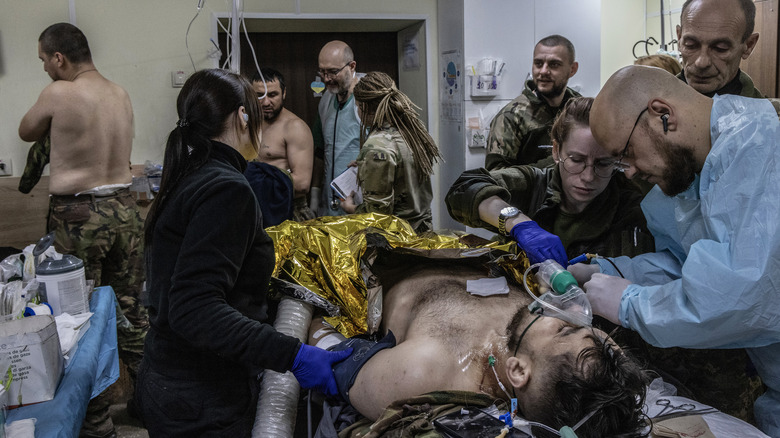The Most Dangerous Jobs On Dirty Jobs
Although "Dirty Jobs" is certainly a fitting title for the Mike Rowe series, it would almost be accurate to always call the featured professions dangerous as well, because the two often go hand in hand. For instance, many people are overly concerned with the disgusting aspects of waste collection when really, it is the life-threatening risks involved that more viewers should worry about.
While any occupation can have hazards related to the work, there are several that make the list as the ones with the highest potential for severe injury, or even fatalities. The host may have never been as at risk himself when he visited the various job sites, but Rowe made sure to cover a good amount of these often scary, yet vital, roles in society. Overall, the recently revived show had too many occupations rife with danger to discuss them all, but below are the ones that require the most courageous individuals.
Oil drilling workers
Drilling on an offshore oil rig can be one of the deadliest careers for a worker in the U.S. Fortunately, accidents are not frequent, but when they do occur, they almost always lead to either severe injuries or fatalities for those involved, according to Time. Just in 2008, the Bureau of Labor Statistics stated that there were 120 deaths of individuals which occurred while they were working in the oil and gas industry. Similarly, onshore rigs have many of the same risks involved as their sea-based counterparts, which OSHA has compiled in a terrifying list of potential hazards.
As both an essential and lucrative job for decades, oil drillers are a perfect example for the "Dirty Jobs" series, so it makes sense that Mike Rowe met with them early on in the eighth episode of Season Two (per IMDb). In his brief interaction with the roughnecks on solid ground, the host not only became filthy after being doused in petroleum from the well the team worked on, but the highly flammable substance covering everything and the heavy equipment alone made it super apparent that if anything went wrong, the results could be devastating.
Roofers
Any jobs that require people to operate at higher elevations have the potential of falling accidents, so roofers are constantly at risk in their working environment. As if that was not dangerous enough, CNN points out that workers of the profession are not entirely safe on the ground either due to the risk of fallen debris. Then there's always the potential risk of electrocution and exposure to harmful chemicals while on the job. 2012 also clearly showed how lethal inexperience could be for those just starting their careers as an influx of new people led to a small — but noticeable — increase in deaths.
For the seventh episode of Season One of "Dirty Jobs," Mike Rowe spent time with veteran hot tar roofers as they replaced the roof of a church in the heat of the afternoon sun (per IMDb). The host then got to personally witness how difficult the job could be when a crew of six guys had to hoist a chute up the side of a building using only ropes and their own strength to do so. If the ropes snapped or any other accident occurred, the workers would have been lucky to survive the ordeal with only injuries.
Garbage collectors
At the beginning of "Dirty Jobs" in Season One, Mike Rowe briefly worked as a garbage collector for San Francisco's Chinatown, and even in that short amount of time there was tons of refuse that he had to deal with (per IMDb). Although very few would deny that the work could be rather nasty, a career in waste management is not often thought of as an exceptionally dangerous choice, yet that is certainly the case.
The profession involves quite a few risks, mostly from the heavy, dangerous machinery that the workers frequently operate, says The Atlantic. Fortunately, the job comes with a rather significant salary that can lead to a six-figure income for some, yet that sort of money may still not be enough to entice anyone into that particular line work if they are aware of the statistics. More garbage collectors die while clocked in than miners, construction workers, or even police officers.
Farmers
Throughout the "Dirty Jobs" series, Mike Rowe encounters many different kinds of farmers. Just in the first season of the series, the host covered the more conventional farmers who focus on raising pigs, to the considerably more exotic practice of ostrich farming (per IMDb). Rowe also worked on a far more frightening alligator farm in the fifth episode of the following season, but regardless of the type of farming one specializes in, there are quite a few significant risks that are faced by those in the industry.
In fact, being a farmer is one of several professions on this list that are more dangerous than firefighters and police officers. Specifically, according to the University of Missouri Extension, the majority of those killed on the job met their death from tractor rollovers. After 1985, laws made sure that newer models incorporated devices to prevent rollovers; however, the machinery is so expensive that farmers often continue to use their older tractors when possible, despite the potential for fatal accidents. These tragedies are the major reason why farming is one of the most life-threatening career paths within the U.S.
Firefighters
While there are many jobs that have significant risks attached, there are few professions that intentionally seek out dangerous conditions. Yet, this is the ultimate goal of firefighters, which makes these courageous professionals an obvious choice as one of the most perilous occupations of all time. On top of the initial hazards like raging flames, extreme heat, and buildings caving in, the rescue workers are also highly susceptible to illnesses suffered from the volatile environment they operate in, such as lung damage, asthma, heart disease, and cancer, according to Chron.
The best firefighters know exactly why flames ignite in any situation and are able to easily start their own in a controlled way as a learning exercise. When Mike Rowe met with the first responders in the second season of "Dirty Jobs," they taught the host these vital skills; first, how to cause a building to burn, but then more importantly, how to later put it out (per IMDb).
Power line men
The possibility of fatal electrocution is a critical concern for more than one of the occupations featured on the "Dirty Jobs" series, but none of them face that risk as often as those who work on power lines. That fact led CNN to say that the work of these crucial service personnel is some of the most dangerous across America. But it's more than that, particularly because the conditions are extremely hazardous during harsh weather or in the darkness of night. Even with access to advanced safety technology, 27 individuals still lost their lives working the power lines in 2011, according to the Bureau of Labor Statistics.
Mike Rowe provided viewers with a glimpse of a standard and essential task of the occupation in the seventh season of the show when he assisted with the replacement of a power pole that was removed in Wyoming (per IMDb). But as is more often the case than not, the protective gear the team used kept them safe from harm as while completing the job.
Construction workers
As host of "Dirty Jobs," Mike Rowe has spent time with workers in construction on more than one occasion. One of the most notable occurred during the most recent ninth season when he helped a crew with the incredible goal of building the remainder of a bridge in a day (via Discovery). Not only did the work require considerable upper body strength, as well as the dexterity to traverse across the rebar frame, but it was all done under the oppressive heat of the sun in Tampa Bay, Florida. By the end of it, Rowe agreed that rod busters have the most strenuous careers of all in the construction industry.
Likewise, CNN marked construction laborers down as another exceptionally dangerous profession in the U.S. because of several potential hazards at worksites, like cave-ins, debris plunging down from above, and exposure to electrical lines. Still, just like roofers, the top cause for fatalities in the industry is accidental falls off of structures. According to Scott Schneider from the Laborers Health & Safety Fund of North America, over 250 laborers die in this tragic way annually.
Highway maintenance workers
Road workers face near-constant threats on the job as they literally operate right beside to fast-moving traffic all the time. Due to these especially hazardous conditions, worksite deaths reach an astounding number of close to 800 deaths every year, and that's with 203 of those tragedies being a result of a vehicular collision at high speeds, according to the Federal Highway Administration (via ISHN). Even at slower velocities, the majority of the remaining fatalities are still from automotives striking workers on the job. Over the decades, extensive measures have been put in place in the attempt to optimize safety for the essential personnel; however, they continue to face potentially lethal risks nearly every time that they operate. And of all the positions within the occupation, the flaggers remain the ones most vulnerable to fatal hits from oncoming commuters.
For "Dirty Jobs," one of the types of professionals that Mike Rowe encounters in the industry are asphalt pavers (via Discovery). The Nebraskan road workers teach the host the basics with their methods of paving the highway.
Concrete finishers
Of all the professionals on "Dirty Jobs," experts who work with concrete do not operate in the most dangerous environment, but they still encounter significant hazards. In the sixth season, Mike Rowe got the chance to visit a company that specializes in the creation of furniture and other large household products molded with the resilient material, including a countertop, bathtub, and a firepit (per IMDb). While the host got some insight into their techniques of working with concrete, he also enjoyed some time operating their forklift.
But it's not always fun and games for concrete finishers in everyday life because they could easily harm themselves if not careful. According to OSHA, there is the constant risk of exposure to toxic substances, both from dry cement and wet concrete. By far the worst would be the potential for silicosis or lung cancer from inhaling silica, but there is also the possibility of chemical burns and other injuries to the skin or respiratory system.
Mechanics
Mechanics may not have as life-threatening of a career as others showcased on "Dirty Jobs," but there is certainly the potential of severe damage caused by the workplace conditions. Permanent hearing loss is one of the most serious concerns in this case as decibel levels often far exceed the healthy level of 85, especially in automotive shops, says Audiology and Hearing Health. Plus, there are other common hazards, such as electrical circuits, battery acid, carbon monoxide, asbestos, or accidents from tools and heavy equipment that could easily maim someone in an instant if they're not careful enough, as per Chron.
For "The 100th Dirty Job Special" episode, Mike Rowe met with a mechanic who serves with the United States Army (per IMDb). Then again in the seventh season, the host showed the audience a much more niche variation of the profession with the behind-the-scenes work of a pinsetter mechanic at a bowling alley, according to IMDb.
Miners
Back in 2010, as many as 50 to 60 coal miners perished on the job per year, making it a strong contender for the most dangerous job, according to ABC News. While safety measures have become far more advanced than the past method of keeping canaries close by to monitor the air quality, mines have always been one of the deadliest environments to work in. From breathing in poisonous gases like methane and carbon monoxide to explosions — and the equally terrifying prospect of being buried alive — the conditions can rapidly become hellish once things go wrong.
In the latter half of Season One of "Dirty Jobs," Mike Rowe witnessed firsthand the claustrophobic working conditions of coal miners (via Discovery). Then in the third season, the host upped the ante by setting off a controlled explosion within a salt mine to make the valuable substance easier to obtain in smaller chunks (per IMDb). Even though the chances of any harm being done were minimal, the shock of the blast alone was enough to rattle Rowe as the whole world shook in the small confines.
Snake wranglers
Mike Rowe got to spend time with brave snake wranglers on two occasions for "Dirty Jobs," the first of which was in Season Three with Texan farmers who raise some of the largest and deadliest specimens on the planet (per IMDb). Then years later in the seventh season, the host joined with a wrangler in a considerably less controlled environment and hunted the creatures to remove them safely from people's homes in Australia (via Discovery).
Wrangling snakes may be a far less common profession than many of the others on "Dirty Jobs," but that certainly does not make the work any less deadly. On the contrary, it's incredibly dangerous. The Natural History Museum in London goes further to describe the other horrific effects that a single bite from some venomous snakes can have on the body aside from loss of life. This includes blood clotting, paralysis, and the absolutely terrifying condition necrosis that eats away at the skin.
Animal control specialists
In the sixth season of "Dirty Jobs," an entire episode was dedicated to workers who deal with animals on a daily basis (per IMDb). From performing dentistry on a moose to the much more depressing and disgusting task of removing decaying animals out from under a crawl space with a control specialist, Mike Rowe was able to witness the work of these hard-working — though often compassionate — individuals.
Although it does not seem as obvious at first, nearly all occupations that handle animals, both wild and domestic, come with significant risks mostly because they can be so unpredictable, says CareerCast. Not only are some much larger and stronger than humans — like the cattle and horses which are responsible for the deaths of dozens every year — there are others who can cause severe damage with bites if they feel threatened, especially large dogs. But data from the Humane Society shows that much of this danger would be eradicated if some people were not responsible for causing these problems themselves by doing things like hoarding animals in buildings.
Combat surgeons
There are few places in society that are more dangerous than active warzones, and combat surgeons operate almost exclusively in that volatile environment. For an episode in the ninth season of "Dirty Jobs," Mike Rowe trained with a team of these brave specialists and learned how stressful the occupation often is under battlefield conditions (via Discovery). To achieve this, the most realistic scenarios were expertly set up for the host so that he could witness the incredibly tense situations without actually having to be there.
According to an international report from the Red Cross, over 1,800 violent attacks were made on health care workers across the world from 2013 to 2014, and of these, 168 of them were slain in the process. Although the shocking numbers represent all kinds of medical professionals, those who operate closest to the battle lines likely make up the majority of cases, combat medics very much included.
